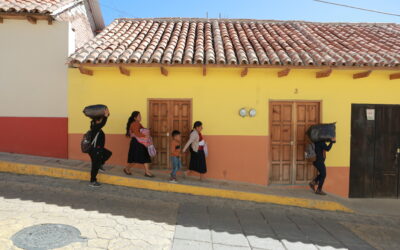I really enjoy cooking. I especially like trying new recipes that I get off the internet.
Yes, I’m a professional chef. In the morning I wash and cook plantains.
The day before I prepare the beans and let them cool.
I mash the plantains, then form them into little balls. What I’m making is called rellenitos.
I like selling them too.
I like to see the children smile, or sometimes cry, when the parents don’t buy them.
I save money now for my children’s future because someday we might have hard times. I’d like them to have their own business. Not like mine, something bigger.
I was always selling before, but I wasn’t looking over my gains or losses.
This program helped me a lot because I was able to grow my business.
During the pandemic I changed my strategy. I stopped selling rellenitos and sold plantains by the dozen. It went well for me, and I made a lot of income.
My advice is to look for an opportunity, have a strategy and don’t be ashamed.
Start a business and use it to your advantage. I know it’s possible.


